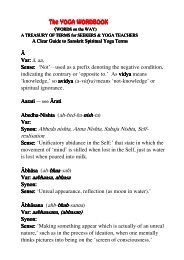Words on the Way - Muz Murray Mantra Yoga Master
Words on the Way - Muz Murray Mantra Yoga Master
Words on the Way - Muz Murray Mantra Yoga Master
You also want an ePaper? Increase the reach of your titles
YUMPU automatically turns print PDFs into web optimized ePapers that Google loves.
“When your Advaita-nishtha is accompanied by <strong>the</strong> utterance of Aham Brahma Asmi, you get<br />
Sabdanuvida Savikalpa Samadhi. When <strong>the</strong> repetiti<strong>on</strong> drops down, you enter into <strong>the</strong> pure<br />
Nirvikalpa Avastha. Para-vairagya is Antaranga Sadhana for entering into Nirvikalpa Samadhi.<br />
All <strong>the</strong> objects appear as Atyanta Mithya like mirage in <strong>the</strong> sand. Even all subtle desires vanish,<br />
when you develop this type of highest Vairagya.” 2<br />
To most of us n<strong>on</strong>-scholarly beings this kind of thing is as clear as mud. And if this is <strong>the</strong> case<br />
with writers such as Sivananda, who are earnestly attempting to get <strong>the</strong>ir message across to readers,<br />
what to say of <strong>the</strong> books written by academics The professorial texts are even more obscure. Here<br />
follows an ‘explanati<strong>on</strong>’ for <strong>the</strong> general reader from a well-meaning Sanskrit scholar:<br />
“There seems to be some c<strong>on</strong>fusi<strong>on</strong> between Åna~damaya and Åna~dmaya-koça since<br />
sama‚†i and vya‚†i aspects of creati<strong>on</strong> are not taken into c<strong>on</strong>siderati<strong>on</strong>. Åna~damaya is<br />
<strong>the</strong> kåra~a-çarira Ûçvara while åna~damaya-koça is that of <strong>the</strong> jiva. The ‘koça’ part of<br />
åna~damaya-koça is avidya which Ûçvara is devoid of. In <strong>the</strong> latter case, it is<br />
Åna~damaya where <strong>the</strong> ‘maya’ aspect is ‘maya’ with sattva-guna as suddha-sattva<br />
giving rise to omniscience etc., to Ûçvara.” 3<br />
So I am glad at least that c<strong>on</strong>fusi<strong>on</strong> is cleared up for you.<br />
Thus it is that so many Sanskrit words appear without any elucidati<strong>on</strong>—or even a glossary—(as<br />
‘everybody-in-<strong>the</strong>-field-knows-<strong>the</strong>-meaning’). Such assumpti<strong>on</strong>s cause academic writings to be<br />
virtually incomprehensible to <strong>the</strong> layman. It is an unfortunate habit of professors to write mainly for<br />
<strong>the</strong> eyes of o<strong>the</strong>r specialists. And <strong>the</strong>ir delight seems to be to write as obscurely as possible—<strong>the</strong><br />
more obscure <strong>the</strong> better—which makes <strong>the</strong>ir work appear more erudite. But for we lesser mortals<br />
who <strong>on</strong>ly want to understand <strong>the</strong> meaning, reading <strong>the</strong>ir texts can be a torture and an exercise in<br />
futility.<br />
Even <strong>the</strong> much-vaunted Vedas are mostly incomprehensible, even to academics. Metaphors in <strong>the</strong><br />
poetical fancy of <strong>the</strong> Vedic seers, which were current in <strong>the</strong> Vedic period of antiquity, are no l<strong>on</strong>ger<br />
accessible to us for <strong>the</strong> most part. For example, in <strong>the</strong> Rg Veda, 4 a hymn to <strong>the</strong> dawn states: ‘The<br />
rising sun lets out his cows.’ No amount of learning Sanskrit words or breaking <strong>the</strong> syllables down<br />
into root meanings, will give us <strong>the</strong> remotest clue that <strong>the</strong> metaphorical meaning here is intended to<br />
say that ‘<strong>the</strong> sun releases its beams.’<br />
And similarly, in ano<strong>the</strong>r such verse, which calls dawn ‘<strong>the</strong> mo<strong>the</strong>r of kine,’ which is intended<br />
means ‘<strong>the</strong> originator of rays of light’ is similarly incomprehensible without knowing <strong>the</strong> poetical<br />
idea behind <strong>the</strong> allusi<strong>on</strong>. So unless <strong>on</strong>e is steeped in <strong>the</strong> metaphysical understanding as well as <strong>the</strong><br />
obscure metaphorical and poetical fancies of <strong>the</strong> ancient seers, not to menti<strong>on</strong> <strong>the</strong> intenti<strong>on</strong>al cryptic<br />
obfusticati<strong>on</strong>s of <strong>the</strong> sages, <strong>the</strong> reading of <strong>the</strong>se ancient texts bears little fruit.<br />
Alas, that is not <strong>the</strong> <strong>on</strong>ly problem. In countless books by various gurus, swamis and backyard<br />
‘professors’ (who are less poetic but no less obscure) <strong>the</strong> implied meanings of <strong>the</strong> same terms are so<br />
disparate (as used by each school of thought), that it is difficult to believe it is <strong>the</strong> same word being<br />
used in <strong>the</strong> different instances.<br />
Ano<strong>the</strong>r problem is that Sanskrit terms are also subject to widely diverse transliterated spellings.<br />
So when a seeker thinks he has come to understand or remember a certain term, <strong>the</strong> next time he<br />
finds <strong>the</strong> word spelled in a totally different fashi<strong>on</strong> in ano<strong>the</strong>r text, he has doubts if it is <strong>the</strong> same<br />
word after all. And often it appears to have a completely different meaning or sense in <strong>the</strong> c<strong>on</strong>text.<br />
For example, even a familiar word such as ‘swami’ may also be seen written as swamy, ‘svami,’<br />
‘svamin,’‘s’aami’ or even ‘samy.’ So when it comes to more complicated philosophical terms <strong>the</strong><br />
c<strong>on</strong>fusi<strong>on</strong> can be c<strong>on</strong>siderable.<br />
In this volume I present <strong>the</strong> results of over 50 years of collecting <strong>the</strong>se quirks and anomalies,<br />
which will hopefully prevent <strong>the</strong> bemused seeker from giving up <strong>the</strong> attempt to read <strong>the</strong> spiritual<br />
texts altoge<strong>the</strong>r. And like Humpty-Dumpty, even gurus and swamis do not always utilise a<br />
4



